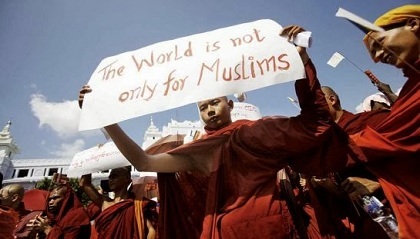Disputes about everything from holy sites to ritual animal slaughter and compulsory family planning are causing dangerous tensions between Buddhists and Muslims in countries such as Sri Lanka and Myanmar.

Friction between Buddhists and Muslims in Southeast Asia is putting pressure on a centuries-long tradition of religious co-existence, tolerance and shared cultural values.
Hate speech, violence involving Buddhists and Muslims, attacks on religious minorities, and new laws designed to control religious conversion, family planning and interfaith marriage are now contributing to increased conflict in the region.
Dramatic increase
In recent years, the number of attacks on Muslim minorities in Buddhist countries has increased dramatically, see for example UN report on Sri Lanka and UN report on Myanmar.
Following repeated waves of violence during 2012, several hundred thousand Muslim Rohingya are now living in desperate conditions in camps in Rakhine State in Myanmar.
The violence in Rakhine has spread to other parts of Myanmar, including Meikthila, where there have been widespread attacks on Muslim minorities. During the same period, there have also been several serious attacks on Muslim minorities in Sri Lanka.
These conflicts between Buddhists and Muslims may serve political as well as economic interests. From a political point of view, the violence benefits authoritarian regimes because it may give them an excuse for military intervention, while economically the conflicts may weaken competitors, for example Muslim-run businesses. In addition, religious nationalism and hate speech against religious minorities are used deliberately by political parties to gain votes among members of religious majorities.
Weak state protection
It is important to clarify that these attacks do not mean that Muslims living in Buddhist countries are generally at risk of persecution. On the other hand, there is a great danger that Muslim minorities will have little protection from the state when other groups see that they have something to gain from starting a conflict. In both Myanmar and Sri Lanka, the police have shown little inclination to intervene to halt attacks on Muslims.
Attacks on religious minorities are taking place in the wake of a continually more widespread opinion among Buddhists in South and Southeast Asia that Buddhism is under strong threat from other religions, particularly Islam.
A key factor is that worldwide the Muslim population is growing faster than the Buddhist population. According to the Pew Institute, the Muslim population will increase worldwide, while the Buddhist population will decline to some extent. This is even true within countries that have a Buddhist majority. On the other hand, the Buddhist population will increase in Western countries, as well as in the Muslim world in general.
Compulsory family planning
In Myanmar, fears of a larger Muslim population have led to proposals for laws to “protect race and religion”. Specifically, the goal is to protect Buddhist women married to non-Buddhist men and to control religious practices in the homes of mixed-marriaged couples. In addition, the laws envisage state control over conversion from one religion to another.
The authorities also wish to implement compulsory family planning in certain regions. This policy is being interpreted as targeting the Rohingya population. These legislative proposals have encountered massive resistance from international, as well as local, human rights organizations. This is because the laws – if they are implemented – will involve gross breaches of the right to freedom of religion, the right to marry the partner of one’s choice, and women’s rights concerning reproductive health. The laws have been passed by the Myanmar parliament after being proposed by radical Buddhist monks.
Disputes about animal rights and holy sites
In Sri Lanka, conflicts between Buddhists and Muslims concern holy sites, ritual slaughter and the niqab.
The disputes about holy sites are not primarily about Islam, but about the status of non-Buddhist shrines in a geographical area defined as holy according to Buddhism. In addition, traditional Muslim practices such as ritual animal sacrifice and halal have attracted criticism from Buddhists.
From a Buddhist perspective, animal rights take priority over the human right to freedom of religion. Many Buddhists consider the ritual animal slaughter during Eid, when Muslims celebrate the end of the fast during Ramadan, as barbaric. The same applies to the slaughter of cattle for food. This interest in animal welfare is particularly weighted against Muslims, who supply beef to the population in general. These feelings are especially strong amongst Buddhists in Sri Lanka, where vegetarianism has become more important to the Buddhist population in recent years.
Heated niqab debate
A new and unexpected debate about the head veil worn by Muslim women has also started to rage. A wave of new Muslim styles of dress has created a debate about the niqab similar to that found in Europe. Secular, as well as traditional, Muslims in Sri Lanka consider the niqab to be alien. A new form of global Muslim puritanism is putting local religious traditions to the test.
Laws about religious conversion, missionary activities and interfaith marriage are being promoted in order to control relations between religions and prevent conflict. The danger however is that increased control will lead to more, not fewer, conflicts. Discrimination against religious minorities may lead to radicalization. In addition, relations between religious minorities and the religious majority in a single state may have regional consequences, since a minority in one state can be the majority in another, and there is an increasing trend for co-religionists in different countries to act in support of each other.
Accordingly, the rights of religious minorities are not only a question of freedom of religion and basic human rights, but also affect security and peace-building in the whole region.
- This text was published in Norwegian in Aftenposten 19 May 2015: ‘Tradisjonen for fredelig sameksistens står i fare. Årsak: Gnisninger mellom buddhister og muslimer‘
- Translation from Norwegian: Fidotext